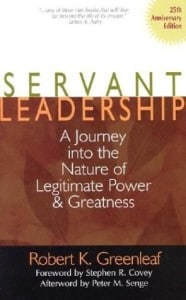
Set No More Than Six Personal Values
“Values tell you what to do when you don’t know what to do.” -Tom McCoy, executive vice president, CH2M HILL Your personal values are essential. They set your moral compass. They guide your behavior when you are under the stresses of life. Most people have not clearly articulated their personal values, and we strongly encourage you to do so. Recently, someone contacted us with questions about developing her personal values. She had difficulty selecting three to six values, as we recommend, and further wondered if it is advisable to have separate personal values versus work values. Yes, most people have

New to the Boardroom? How to Succeed
Congratulations. You’ve just been invited to join your first public company board. Great. Now, what can you expect? It’s not just approving the CEO’s strategy or officer compensation recommendations after asking a few questions. It’s more than risk assessments, financial statement reviews, and meeting with the outside auditors periodically. It’s much deeper and more complex, especially if you want to bring a new brand of leadership to the boardroom. You will be confronted with difficult challenges you are not likely to have faced before. What do you do? When do you lead assertively? When do you lead softly? When do

The Ethical Challenges Faced by Leaders
“Divorced from ethics, leadership is reduced to management and politics to mere technique.” -James MacGregor Burns We all face ethical challenges and dilemmas, and all the more so if we lead. Think how you would act in the following scenarios: You give the cashier a $10 bill, and she gives you change for a $20. You realize it in the parking lot. Do you trudge back and give her the money? You incur some personal charges on a business trip. Do you fudge some expenses to help cover these costs? Do you overestimate your charitable contributions on your tax form

Double Your Productivity in 15 Minutes
guest blog by Dan Forbes, Founder of the Lead With Giants™ Community In the early 1900s Charles Schwab was president of Bethlehem Steel, a small, struggling company. He was looking for ways to increase productivity and profits. In walked Ivy Lee. He was a business consultant and promised Schwab that in just fifteen minutes he could share a secret with the company’s managers that would double productivity. The skeptical Schwab asked Lee what he was selling and at what price? Lee told him to just try it for six months and then, “You can pay me what you think it’s worth.”

The Dangers of Toxic Micro-Cultures
Does your organization have some toxic micro-cultures? If so, you ignore them at your peril. Much is written these days about the importance of culture in boosting an organization’s success. Strategy is important, as are talent, business models, innovation, and more. But culture, “how we do things here,” as we like to define it, can be the trump card, because it permeates everything in an organization. Culture is what people do when the boss is not around. Wise leaders craft the culture purposefully and make the desired behaviors explicit and clear. The Impact of Culture on Ethical Behavior Culture

Learning to Trust Your Judgment
(This blog was previously published by Trust Across America – Trust Around the World as a part of their 100 Days of Organizational Trust program.) Many folks are reluctant to trust their own judgment. They may feel they should not speak up when some alarm bell is going off in their head for a variety of reasons: “It’s not my job to speak up.” “I’m not in a position of leadership or authority.” “I’m not smart enough on this topic.” “I don’t have the experience needed to speak up.” All these blocks are normal, but we need to learn to

A Life in Leadership: The Legacy of Warren Bennis
Recently, the world lost a giant in the field of leadership and a remarkable human being, Warren Bennis, who passed away at age 89. I was fortunate to get to know Warren years ago through a mutual friend, Christopher Gergen. Together, the three of us strolled by the beach in Santa Monica, visiting in his home, sharing meals, and—best of all—seeing him in action with his beloved students in “The Art and Adventure of Leadership” course at the University of Southern California. The way he connected with students was remarkable. We also became colleagues of sorts when our book, LIFE

Servant Leadership through Time
The concept of leaders as servants goes back into ancient history but was articulated most clearly in the 20th century by Robert Greenleaf in an essay, “The Servant as Leader,” published in 1970. In the next four years, two more essays explored ideas that an entire institution – and a society – could act as servants, and that trustees should act as servants. In 1976, Paulist Press published Servant Leadership: A Journey into the Nature of Legitimate Power and Greatness, a book that combined these and other essays. See The Center for Servant Leadership. Bob joined the chorus in 1995, when he

Paradoxes of Leadership
Paradox: A seemingly contradictory statement that may nonetheless be true. Leadership is rife with paradoxes, competing claims, countervailing pressures, and conflicts. There is frequently a “thesis” and an “antithesis” in leadership dilemmas, often requiring a “synthesis.” Here are some leadership paradoxes and other interesting dualities we have learned: Serving followers and being served by followers Flexing between the hard (steel) and soft (velvet) edges of leadership Being optimistic while staying grounded in reality Having confidence and humility Being decisive and collaborative Protecting people and taking necessary “casualties” Being in charge and unleashing other leaders Getting results (ends) with integrity (means)

Leadership Lessons from The Lord of the Rings
Leaders Venture into the Unknown “It’s a dangerous business, Frodo, going out your door. You step onto the road, and if you don’t keep your feet, there’s no knowing where you might be swept off to.” Bilbo Baggins Leaders Step Up “I will take the Ring,” Frodo said, “though I do not know the way.” The Burdens of Leadership Frodo: “I wish the Ring had never come to me. I wish none of this had happened.” Gandalf: “So do all who live to see such times, but that is not for them to decide. All we have to decide

Put Trust on Your Daily Docket
Let’s assume that as a CEO or board leader you want your firm to be viewed as trustworthy by its stakeholders. You realize a more trusting set of relationships between people will be useful, perhaps even a breakthrough to improved performance. Great. But this is a field where you don’t have expertise. You have been bred in the battles of line and staff assignments where results had to be achieved, new ideas implemented, and problems resolved fast. Building organizational trust is a strange, new endeavor. What can you do? Give them some books to read? Hire a consultant to conduct

Everyone Leads at Times
“Leadership is your choice, not your title.” –Stephen R. Covey Have you ever heard someone say, “I’m just not a leader”? “Fair enough,” you might think. Some people are just not into that leadership thing. Perhaps they have other talents or interests. Or they are reluctant to take responsibility, or afraid of not leading well. Not so fast. Everyone leads something at some time (whether poorly or well). They may lead at home, or with friends, at school, on a project, or at work. And our world desperately needs better leadership—in companies, communities, families, governments, nonprofits, education institutions, and more.

Leaders Must Be Present with People
People won’t follow your leadership if you’re not fully present with them. If you are not present with people, you are not connecting with them. Without connections, the leader/follower relationship breaks down and trust is undermined. People feel devalued. You’re sending a signal that they’re not important. As a result, they won’t commit to follow you from their hearts because you weren’t engaged with them. But wait, you say, “In this age of high-tech and hyper-speed, I’ve got to multi-task. You don’t understand what I have to juggle: downsized staffs; cut budgets; doing more with less; 24/7 communications and social

The Triple Crown of Leadership
The sports world is abuzz with excitement. We may have our first Triple Crown winner since 1978, when Affirmed captured what has been called “the most elusive championship” in all of sports. California Chrome is poised to accomplish this incredible feat on June 7 if he can win at Belmont Park. This unlikely horse, bred in California for only $10,000 with a 77-year-old trainer, has won his last six races. Since 1875, only eleven thoroughbreds have won the Triple Crown, including such iconic names as War Admiral, Whirlaway, Citation, Seattle Slew, and of course, perhaps the best of them all,

Rationalizations that Derail Leadership
“The softest pillow is a clear conscience.” –Narayana Murthy, Co-founder and former CEO, Infosys Our ability to rationalize our behavior is astonishing. And dangerous. Basically, we all have a good sense of what’s right or wrong, but we have an inherent ability to talk ourselves into believing that something that’s wrong is really okay. We’re all good at this self-deception, especially when under pressure. Leadership is a moral activity. When done well, it raises people up and brings out their best. Successful ends do not justify unethical means. The journey and the destination must both be based on moral principles
